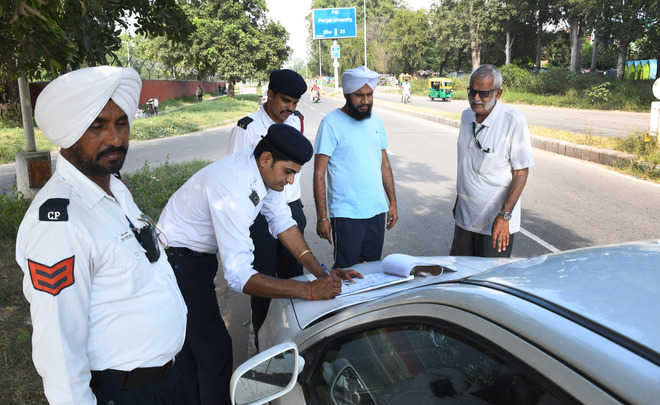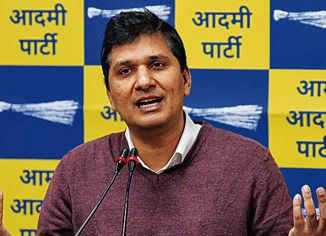
Traffic police officials challan a car driver for jumping the red light at the Sector 38/25 crossing in Chandigarh on Sunday. Pradeep Tewari
Traffic police has failed to implement the old traffic rules. The result is amended Motor Vehicles Act, which provides harsher penalties, about 10 times higher than the previous for traffic violations. Moreover, what is guarantee that new rules will stop accidents/deaths when the road network is teeming with potholes and has black spots, which contribute to mishaps? Before increasing the fine both the Centre and state governments should improve the road infrastructure. Certain states, especially where elections are due have slashed fines or declined to implement new rules as their election prospects are at stake. It indicates that the Ministry of Roads and Transport has left it to the states/UTs to decide/amend fine for violations at their own level. The UT Administration may also slash fines for traffic violations.
AS Ahuja, Chandigarh
Aim is to discipline road users
The aim of new the Motor Vehicles Act to levy hefty fines inorder to discipline road users as their lives are precious for them as well as their family members. Around are 4.5 to 5 lakh accidents occur every year in which almost one third of the lives are lost. Imagine the plight of a family whose bread winner has died in an accident. This subject is on the concurrent list. Hence, every state has a right to slash traffic fines on humanitarian grounds as the authorities concerned deem fit.
Harish Kapur, Traffic marshal
No hidden atrocity in amended MV Act
Chandigarh is a leading horse in the race for a good cause. It should not look backward. A city well-designed and organised with first-class road connectivity must not give it a second thought. Stern laws are for the public welfare. Therefore, hefty penalty is no way more precious than our lives. Moreover, the law is quite linear and non-debatable. If penalty pinches you, abide by the law. There is no hidden atrocity.
Upasana, Chandigarh
Violations deep rooted in culture
About 93 per cent road accidents take place due to traffic violations like speeding, drunken driving, wrongly overtaking, caring not two hoots for the traffic lights and so on. The aim of the government is not to generate revenue with the new MV Act, but to deter traffic violators. A few state governments are in total denial mode for the implementation of the Act while some have soft paddled the fine slabs. Since indiscipline and violation of road safety norms is so deep rooted in our culture, such stringent and deterrent laws must be retained and enforced in true spirit till the time of realisation by each to abide by the civic rules gets into our character.
SS Arora, Mohali
Review Act before implementation
States not levying new fines are doing the right thing. The amended MV Act is quite harsh because in some cases fine imposed is more than the value of vehicle. This will prompt owner/violator to abandon his/her vehicle. The amended Act requires a review before its implementation. The Chandigarh Administration should also go slow in its implementation. The Central Government should have taken states into confidence before finalising fines to make it uniform throughout the country. The states on their part should write to the Centre about their views.
Bharat Bhushan Sharma, Chandigarh
Penalty will stop violation of rules
The amended Motor Vehicles Act is a welcome step to avoid accidents and save precious lives. However, the penalty is not aimed at collecting money, but to prevent misuse of rules. The Chandigarh Administration should have launched a campaign to create awareness and educate people, entering city from other states, about the stern provisions of the new MV Act and penalties. Unlike Chandigarh, elected state governments are more accountable to the people. That is why many states, including BJP ruled either put the implementation of the Act on hold or slashed traffic fines. The Assembly elections has prompted the Maharashtra government not to implement the Act. Haryana too has put hefty fines on hold keeping in view the upcoming poll. The UT Administration should follow neighbouring states and reduce fine.
Col Balbir Mathauda (retd), Chandigarh
Fines will curb rash driving
Everyday many people get injured or killed because of road accidents that occur mainly due to negligence and carelessness of drivers, lenient traffic rules and to a large extent drunken driving. The move of imposing hefty fines for offences like speeding, not wearing helmet and using mobile while driving will help curb the menace of rash/negligent driving to some extent. Behavioural counselling can change mindsets of the people. Education sector and media can enhance community awareness by making people understand casual factors and real costs of road crashes.
Dr Shruti K Chawla, Chandigarh
Enhanced fine unbearable
The amended Motor Vehicles Act, 2019, has provided sharp teeth to the traffic administration to deal with defaulters having apathetic attitude. Gujarat, Haryana, Uttar Pradesh, Panjab and some other states have mustered courage to scrutinise the harsh provisions regarding imposition of hefty fines on defaulters for petty traffic violations. The rates of revised fines have been enhanced many times, which is prima facie unbearable and unjustified. No doubt deterrent factor is needed in the amended Motor Vehicles Act to convey strong message to regular defaulters, but its provisions should be soft and affordable for the common man. The Chandigarh Administration has implemented the new Motor Vehicles Act without analysing its far reaching economic and social repercussions on society.
Bhupinder S Sealopal, Mohali
A wise decision of UT Administration
Instantly implementing amended Motor Vehicles Act is a wise decision of the UT Administration as it is fully in the public interest. People are alert and keep all vehicle-related documents with them. At start, heavy fines and other revised provisions of the amended Act may seem uncomfortable to the public, but these are truly life saving and should be acceptable to all. States, which have not implemented the revised Act, are not doing justice to the public. The Chandigarh Administration should never think of rolling back the new Act. If done, it will put public once again in the danger zone.
Balbir Singh Batra, Mohali.
Don’t harass public by issuing hefty challans
Like Gujarat, the Chandigarh Administration should also reduce traffic fines. A wise doctor always tries to cure his/her patient with simple dose of medicine. The Chandigarh traffic police should learn and follow the Hyderabad police, which is helping in issuing driving licences and helmets to commuters rather than harassing them by issuing challans with heavy fines.
Sohan Lal Gupta, Patiala
Follow more risk, more penalty criteria
The Chandigarh Administration must rethink on the implementation of the amended Motor Vehicles Act, 2019. The Administration must take a practical and rational view on penalties to be imposed for traffic violations. The penalties should neither be too harsh nor too soft. Many BJP-ruled states have decided to reduce fines under the amended Act. The amount of penalty should not be influenced by political decisions. Moreover, rules should be uniformly applicable to the whole country. There must be a balance of harsh and soft penalties like drunken driving should invite stringent penalty and non-compliance of pollution norms a bit less. The criteria for determining penalty may be more the risk to public safety, more the penalty. Underage driving should be in the “No tolerance” category.
Rajender Kumar Garg, Zirakpur
Distinguish between simple, serious offences
The main ground for the steep rise in fines for traffic rules violations being projected is large number of road accidents. While some violations like drunken driving, jumping red lights, talking on mobile and speeding definitely become cause of accidents, but how do not wearing seat belts, helmets or not carrying registration and insurance papers contribute to mishaps? There is need to distinguish between serious and simple offences and fines be fixed accordingly. Fines for simple offences should be nominal and for serious offences, which put other peoples’ life in danger should definitely be higher. Fines should also not be so steep, which may force driver to surrender his/her vehicle rather than paying the amount.
BS Cheema, SAS Nagar
Centre has come up with good law
It is after a long time that the Centre government has made a good law to curb traffic violations. But what a mockery, even the BJP ruled states are not implementing it. We have seen that people do not obey any rule unless heavy penalty is imposed. The biggest problem in our country is that laws are passed in the Parliament, but are implemented differently in each state. If traffic laws are to be implemented in true letter and spirit, no relaxation should be given in any state or union territory.
Surinder Mohan, Chandigarh
Government must rethink on fines
There should be uniformity in traffic fines all over India. While deciding fine rates, the government should keep in mind people from lower sections of society apart from the elite. The government should not put unnecessary burden on pockets of citizens. Fines have nothing to do with any political party. Fines are just a means to make people realise importance of the traffic rules and human lives. It’s not a source to earn revenue. So, the government needs to rethink once again while imposing hefty fines on the public for the traffic rules violations.
Abhilasha Gupta, Mohali
Amended MV Act has many ambiguities
The BJP-ruled Gujarat reduced fines under the amended Motor Vehicles Act. Punjab is yet to implement the new Act. Haryana has also put hefty traffic penalties on hold. The Chandigarh Administration is otherwise following the Punjab rules then why it is proactive to slap hefty fines under the new Act? Moreover, when the UT Administrator and Punjab Governor has made it clear that there is need to counsel and warn violators, why the traffic police is not considering his advice? Why hefty fine is not imposed on officials responsible to maintain roads and traffic lights? There are many ambiguities in the amended MV Act, which must be removed. Don’t push people to the wall. Even the British did not make such anti-people and anti-poor Act.
Capt Amar Jeet Kumar (retd), Mohali
Relaxation for Parents riding two-wheelers
It is state government’s responsibility to implement or amend the new MV Act while keeping in view prevailing circumstances in the area under its jurisdiction. In some states alcohol is prohibited. There are no wine shops in such states. Similarly, the Motor Vehicles Act has been amended by the Government of India for the safety and security of the people. Residents of the City Beautiful are responsible and sensible. But they don’t have much sources of income to send their children on rented vehicles to schools or institutions of higher education. The onus lies on parents to drop and pick up their wards from tuitions, schools and other places. So, if parents carry their two children on a two-wheeler wearing proper head gear, they may not be challaned and given relaxation.
Anokh Singh Kahlon, Mohali
Fines must not be source of revenue
There is steep increase in fine for traffic violations. This warrants reduction by 50 per cent except in the case of underage/rash driving, overloaded and unauthorised/unfit vehicles. Instead, the focus should be on honest implementation of the amended Motor Vehicles Act. Traffic fines should not be treated as source to generate revenue, but as a tool to instil fear in the minds of drivers. Road users should become law-abiding citizens. Traffic violation laws should be applicable uniformly throughout the country.
KC Rana, Chandigarh
It’s murky politics of vote bank
It is shameful that the BJP-ruled states have given a negative response to increased fines under the new Amended Motor Vehicles Act and declined to implement the same in toto. This is keeping in view state elections in Haryana and Maharashtra. It’s all due to the murky vote-bank politics. Yes, fines of traffic offences are so high that offenders and traffic policemen indulge in corruption with money changing hands. Either the new rules should be implemented with an iron hand or fines reduced and checking intensified. The conditions of roads should also be improved as per the rules.
RK Kapoor, Chandigarh
Move far from ground reality
The authorities concerned are fleecing people. Since the state governments are not bound to strictly follow the highly punitive rates for traffic rules violations included in the MV Act, recently amended by the Centre, many BJP-ruled states have declined to follow them. These states have felt the pulse of the people and acted with wisdom. But in Chandigarh, despite the UT Administrator not happy with hefty fines on the people under the garb of their safety on roads, the traffic police here is still unrelenting. It appears that they get inspiration from the city MP, who has openly supported hefty raise in challan rates for various violations. Her contention that the move is meant to avoid deaths in road accidents appears to be far from the ground reality. If that is really so, all city roads should be free from stray cattle, all dark stretches should be illuminated and roads must be repaired at regular intervals. The local authorities are more interested in filling empty coffers of the government with such anti-people drive.
SC Luthra, Chandigarh
Continue with hiked penalties in UT
Amid the ongoing hullabaloo over heftier penalties for violating traffic rules some states have diluted or put them on hold, but it is no secret that their vote-bank politics/pressure is the culprit. The UT Administration should not succumb to such considerations, but continue with increased penalties for now. Habit formation takes a minimum of 40 days of forced regulation. The endeavour should be to find easy solutions and remedial measures. Helmetless riders should be made to buy helmets on the spot or pay fine and get helmets for free. The MV Act must retain new provisions to curb serious offences like speeding and underage/drunk-driving, but where no damage is likely due to a violation (like overstepping zebra crossing or not showing valid papers on the spot) existing penalties could be reduced. Politics must not play with lives on the road.
Lalit Bharadwaj, Panchkula
New Act protects good Samaritans
The clarity with which Nitin Gadkari and his Ministry have handled the new Motor Vehicles (Amendment) Act, 2019, deserves applause. Traffic rules are for the safety of citizens, not for or of the government. States, which are opposing this, are only doing it for the vote-bank politics. The first two weeks of the new law have proved that steep fines are working well. Does Punjab not remember the death of Partap Singh Kairon or Jaspal Bhatti in road accidents? Penalties aside, traffic rules are for the safety of all road users. The new Act protects good Samaritans too when they help rescue road accident victims. The government should also ensure proper roads with no potholes, clear and illuminated sign boards, working traffic signals and 24x7 highway patrolling by ambulances and the police.
Rajiv Boolchand Jain, Zirakpur
Fines cannot solve problems
Imposing hefty fines by the Chandigarh Administration is not in good taste. The Administration should rethink as heavy fines will not solve the problem. The VVIPs, police and other government officials do not follow traffic rules. Fines should be reasonable so that it does not prick anybody’s pockets. States, which have not implemented the new MV Act, are smart enough as they know nothing will come out by amending it. Teaching motorists consequences of speeding, not wearing seat belts or helmets is more effective then imposing fines. On all roundabouts, screens should be installed to show mishaps and deaths in accidents. It will have more impact on the onlookers.
Opinder Kaur Sekhon, Chandigarh
New Act will check unsafe driving
The new Motor Vehicles (Amendment) Act, 2019, lays the foundation for a major change in India’s approach towards road safety. By steeply raising penalties for various traffic offences, a much overdue step, the amended law certainly has potential to deter unsafe and aggressive driving. The states, which are intending to deviate from the Union Government orders regarding the penalties, must come out of the petty politics. They must ensure to follow these guidelines as heavy penalties will at least deter unsafe driving to some extent. The Chandigarh Administration should continue with the penalties under the new Act. Law enforcement agencies should also be strict while implementing driving safely rules in true spirit. Self discipline is always more paying than facing penalties.
Sanjay Chopra, Mohali
Consider people from all walks of life
The government must take people from all sections of society into account while framing laws related to various traffic violations. Fine for violations, except serious offences like drunk driving, speeding, underage driving and jumping red lights, should be affordable. A fine must not be more than the value of vehicle, which the violator is driving. At the same time people have to realise the importance of safe-driving rules and human lives. Besides, there has to be uniformity in traffic rules and fines throughout the country. Only, honest implementation of the Motor Vehicles Act will give the desired results. The UT Administration must reconsider the amended MV Act and reduce fines. The traffic police should increase checking to control violations in the City Beautiful. Regular nakas (check points) will not only deter violators, but also reduce crime in the city.
HS Gill, Chandigarh
Traffic violators should be penalised, but burdening them with a heavy fine is not justified. If the government is serious about the safety of the people on roads, it should impose a minimal fine on violators of traffic rules and look for other measures to curb the practice.
Inderdeep Singh, Businessman
I don’t find any reason to lessen revised fines in the UT. I have witnessed a change on roads since the implementation of the amended MV Act. Motorists are behaving responsibly and following rules. However, hefty fines should be imposed only on those, who violate traffic norms.
Dr Aman Bhatia
A hefty fine is one of ways to implement traffic rules. Moreover, the UT traffic police have been organising awareness drives to sensitise people to the rules. However, people still break rules. So, I feel revised fines and stricter punishment are the only ways left to enforce traffic rules.
Shamama Amir, Assistant Professor
Though fines are high now, but it is for the traffic offenders only. Law abiders are not affected. The traffic police should consider circumstances before challaning anyone. If a person forgets vehicle documents at home, he/she should be given time to show papers and not challaned.
Hitesh puri , Chairman, CRAWFED
Traffic fines should not be so high that one fails to pay these. The UT Administration should mull over reducing fines so that people, who get challaned, are not burdened with the excessive amount. Instead, the government should look for other ways to ensure enforcement of traffic rules.
Monika Thakur, Housewife
QUESTION
Stray cattle can be seen roaming on roads in Chandigarh, Panchkula and Mohali creating nuisance for the vehicular traffic. The peripheral areas of the City Beautiful are also affected. Do you think the authorities concerned need to take effective steps to end this menace?
Suggestions in not more than 70 words can be sent to [email protected]



























